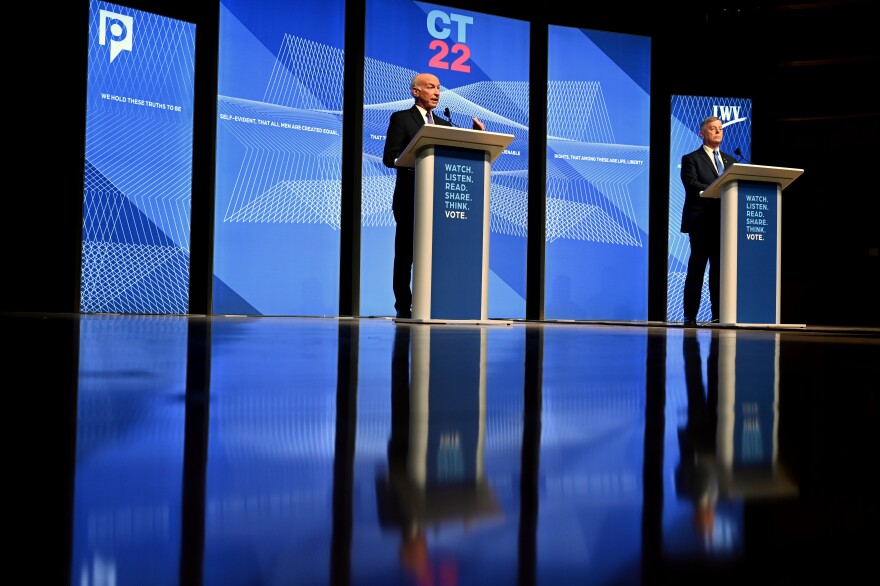The Republican and Democratic candidates for Connecticut’s 2nd Congressional District met in Willimantic Tuesday night for a debate centering on inflation and rising health care costs, immigration and reproductive rights.
Democrat Joe Courtney, who’s represented the 2nd District for more than a decade, said the recent Supreme Court decision to overturn Roe v. Wade has raised privacy issues for mothers while also raising concerns from members of the medical industry.
“The real solution is to restore Roe,” Courtney said. “People want their privacy in terms of how their medical decisions are made between them and their doctor.”
Republican candidate Mike France said he believes abortion access should be a state issue, not a federal one. He said he does not support a total ban on abortion.
“Once the child is viable, that is a time when we should be not looking to terminate the pregnancy,” he said. “[But] looking at other alternatives to support the mom as they’re dealing with these issues.”
Tuesday night’s debate was hosted by Connecticut Public in collaboration with the League of Women Voters of Connecticut.
Here are some debate highlights:
Inflation: A stubborn issue for Democrats
Wall Street remains focused on the hottest inflation in four decades. Consumer prices are rising. Some are concerned about a recession.
Underlying price increases are the result of the COVID-19 pandemic, supply chain disruptions, volatile energy prices and Russia’s war in Ukraine. Some economists believe the American Rescue Plan Act, a $1.9 trillion bill passed by Congress in 2021, also plays a role.
Courtney voted for the measure, which included funding for COVID-19 vaccines, money for schools to reopen and distribution of direct payment relief to Americans alongside extended unemployment benefits.

It was a line of attack for France, who said the infusion of “trillions” of dollars into the economy is driving inflation. He also called attention to the high cost of diesel fuel, which he said is driving up shipping costs that are passed along to consumers.
“That’s something that the people understand every day when they’re filling up their cars or when they go to the grocery store to buy food,” France said.
Courtney said he’s “not under any illusion” that the inflation problem is solved, but he said recent measures signed into law by the Biden administration to lower prescription drug costs and open up more areas to oil and gas drilling will help to eventually rein in some cost increases.
Healthcare: Government involvement vs. letting the markets decide
Courtney said the question of health care costs has been “a persistent issue” since he was elected to Congress. He called attention to a recently passed prescription drug bill and said that will save taxpayers and help control insurance costs.
France said “the more that government has gotten involved in health care, the more expensive it has become.” He said the government has increased oversight on doctors, and that is driving up costs for individuals seeking care.
“The more that we are able to have a free market solution to this and the better that the individual patient can negotiate directly with their doctor for their care, the better,” he said.
Energy costs: Wind and solar vs. oil and gas
France said the key to lowering energy costs is not a “one-size mandate” from the government to back solar and wind power. And he praised the E.U. for a recent decision to keep investments in natural gas and nuclear power plants labeled as climate-friendly.
He also criticized tax subsidies for wind and solar power generation.
“That is not a robust way – a longstanding way – to have a sustainable energy source,” he said.
Courtney said “tax subsidies have been the mother’s milk of the oil and gas industry” for decades.
Immigration: Differing approaches to addressing migrant families

Republican governors have been sending more migrants released at the U.S. border with Mexico to Democratic strongholds, raising questions about their legal status, how they are lured on board buses and planes and the cost to taxpayers.
New England became the latest focus point for the immigration issue in September when Florida Gov. Ron DeSantis flew about 50 Venezuelans to the small, upscale island of Martha's Vineyard in Massachusetts.
“They’re fleeing a dictatorship – a left-wing dictatorship,” Courtney said, adding he thought that would elicit “more sympathy on the Republican side.”
Courtney said that the government was facing a massive backlog of requests from asylum seekers and that the federal government needs to expedite adjudication of asylum applications.
France said that he grew up near the Mexican border in California and that he was “very familiar with this issue” of asylum seekers who were “using the asylum process as their mechanism to get inside this country.”
He claimed that the federal government was not doing enough to enforce immigration law and that asylum seekers were failing to appear for their asylum hearings.
“If they don’t show up, we don’t have any way of knowing where they are in the country,” he said.
Courtney said “roughly about 90% show up for their hearings” and said the rejection rate for asylum applications is high – during both the Trump and Biden administrations. Courtney said “walls are very appropriate in certain parts of the border” near densely populated areas.
Education: More needs to be done to educate high schoolers about college costs

Courtney said the government needs to stop collecting interest on certain federal loans. And he said lawmakers also need to look at the quality of education underwritten by these loans to ensure that borrowers are receiving an education that will allow them to repay the debt.
“There are too many institutions that I think really saddle people with high levels of debt – particularly in the for-profit community,” Courtney said. “We should not be using public dollars to really put people on a pathway that is highly questionable.”
France said “the more federal money that has come into the program, the higher the costs.” He said the country also needs to look at how students are prepared in high school for college and how they make the decision for what to study.
But France said “frankly, I don’t believe there is a role” for the federal government to help borrowers who are saddled with student loan bills.
“When you take out debt of any kind, it’s an investment,” he said. “And you have to pay on that investment.”
Courtney said that he agreed with France that young people need to treat higher education choices as important “life decisions” and that these decisions need more support and focus from high school counselors.
About the candidates
Democrat Joe Courtney has represented the 2nd District for more than a decade after narrowly defeating Republican Rob Simmons in 2006 by only 83 votes. Since then, Courtney has enjoyed much more comfortable margins of victory, including winning by nearly 80,000 votes in 2020. In Congress, Courtney sits on the House Armed Services Committee and the House Education and Labor Committee. He is also chairman of the House Armed Services Subcommittee on Seapower and Projection Forces.
Republican challenger Mike France, a Navy veteran, is serving his fourth term as a state representative for the 42nd District in Connecticut. France is the ranking member of the General Assembly’s Appropriations Committee and bills himself as “dedicated to the principles of limited government, economic freedom, and individual liberty.”

Why certain third-party candidates were not invited to attend the debate
Some 2nd District candidates on the ballot were not invited to Tuesday’s event. They include Kevin Blacker of the Green Party and William Hall of the Libertarian Party.
Candidates had to meet a number of thresholds to participate, said Laura Smits, president of the League of Women Voters of Connecticut, which determined eligibility for the debate.
One of those thresholds is evidence of a formal campaign. She said that includes a campaign manager, staffers, a policy platform and literature, and a website.
Evidence of financial support is also a requirement, she said.
“This is what usually trips up third-party candidates,” Smits said, noting that for U.S. congressional candidates, “contributions of at least $15,000, of which one-third is raised in [the] District” are required.
“The onus is on the candidates to provide us with this information to prove that they have these things,” Smits said. “In the case of Kevin Blacker … he reached out to us a while ago, we sent him that criteria, and he tried to convince us that even though he didn’t meet it, he should be allowed onto the stage.”
“I mean, forget about the financial requirements. He doesn’t even have his own website,” Smits said.
Smits said her organization never heard from William Hall to participate.
“I’ve not heard from that candidate, directly, to ask for our information,” she said.
The Associated Press contributed to this report.
Video: Watch the 2nd District debate





